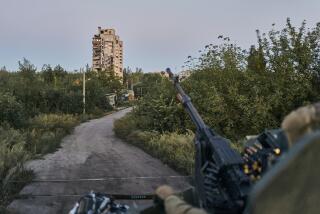Belgrade Gets a Final Warning From EC : Yugoslavia: The army presses attack in the face of Tuesday deadline set by the European Community.
- Share via
ZAGREB, Croatia — The Yugoslav army battered Croatian strongholds throughout the secessionist republic Sunday as the European Community sent a final warning that Belgrade risks economic isolation if it carries on with the war.
Federal infantry in the hills above Dubrovnik showered the Adriatic tourist mecca with shells and grenades, and Croatian Radio reported new outbreaks of fighting in the port of Zadar.
Warplanes and tanks closed in with an intensified assault on the eastern Croatian cities of Vukovar and Vinkovci, and air-raid sirens were set off in Zagreb by a bombing run within nine miles of the Croatian capital.
The stepped-up army offensive came amid rumors that Serbia’s Communist president, Slobodan Milosevic, might be forced by fear of Western sanctions to go along with the division of Yugoslavia into six sovereign states.
The European Community has threatened a trade embargo against Serbia unless Milosevic agrees with the other five republic presidents to support the community’s plan for restoring peace. The EC diplomats overseeing Yugoslav peace talks in The Hague set Tuesday as the deadline for the decision.
Milosevic has so far denounced the proposed restructuring of Yugoslavia into a loose association of independent states as an EC plot to destroy the federation.
Greek Foreign Minister Antonis Samaras traveled to Belgrade, the Serbian and federal capital, to spell out to Milosevic the consequences of rebuffing the other republics and the 12-nation EC, which Serbia depends on for vital trade.
The federal army, which would have no reason to exist after a formal division of Yugoslavia, has backed the Serb militants fighting to prevent Croatia’s secession.
Croatian broadcasts on the intensified fighting have speculated that the army is pressuring Milosevic to stand by his rallying cry of keeping Serbs united in one country, Yugoslavia.
Officials in Zagreb report 2,500 Croatian deaths in the civil war that broke out after Croatia and Slovenia declared independence on June 25. They estimate at least that number of casualties among the federal soldiers and Serb guerrillas.
Neither Serbia nor the federal army has disclosed a death toll, but mortuaries and graveyards are beginning to fill with evidence of the war’s costs, eroding what was once feverish Serbian support for the clash with Croatia.
The Yugoslav warfare has also caused major disruptions in trade and traffic throughout the Balkans. Greece’s vital tourism industry suffered heavy losses over the summer. Trucks carrying goods from elsewhere in Europe to Greece and Turkey were forced to detour through Hungary to avoid traveling through the Croatian battle zones.
Milosevic built his political power base by joining with Serb leaders in other republics in insisting that Yugoslavia stay united so that all 10 million Serbs scattered about the federation of 24 million can continue to live in one country.
A war psychosis was whipped up by a yearlong campaign in the Serbian media contending that Serbs in Croatia would face extermination if the republic became independent. About 12% of Croatia’s 5 million citizens are Serbs.
More to Read
Sign up for Essential California
The most important California stories and recommendations in your inbox every morning.
You may occasionally receive promotional content from the Los Angeles Times.














